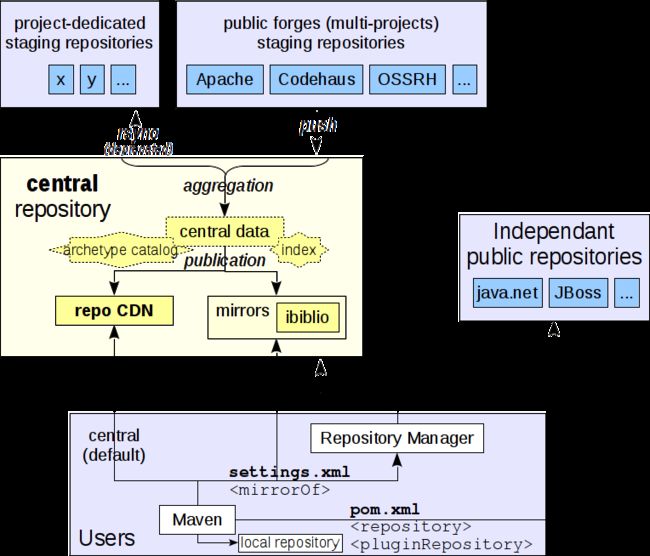利用github搭建个人maven仓库
原文出处: hengyunab
缘
之前看到有开源项目用了github来做maven仓库,寻思自己也做一个。研究了下,记录下。
简单来说,共有三步:
deploy到本地目录
把本地目录提交到gtihub上
配置github地址为仓库地址
配置local file maven仓库
deploy到本地
maven可以通过http, ftp, ssh等deploy到远程服务器,也可以deploy到本地文件系统里。
例如把项目deploy到/home/hengyunabc/code/maven-repo/repository/目录下:
|
1
2
3
4
5
6
|
<distributionManagement>
<repository>
<id>hengyunabc-mvn-repo</id>
<url>file:/home/hengyunabc/code/maven-repo/repository/</url>
</repository>
</distributionManagement>
|
通过命令行则是:
|
1
|
mvn deploy -DaltDeploymentRepository=hengyunabc-mvn-repo::
default
::file:/home/hengyunabc/code/maven-repo/repository/
|
推荐使用命令行来deploy,避免在项目里显式配置。
https://maven.apache.org/plugins/maven-deploy-plugin/
https://maven.apache.org/plugins/maven-deploy-plugin/deploy-file-mojo.html
把本地仓库提交到github上
上面把项目deploy到本地目录home/hengyunabc/code/maven-repo/repository里,下面把这个目录提交到github上。
在Github上新建一个项目,然后把home/hengyunabc/code/maven-repo下的文件都提交到gtihub上。
|
1
2
3
4
5
6
|
cd /home/hengyunabc/code/maven-repo/
git init
git add repository/*
git commit -m
'deploy xxx'
git remote add origin git
@github
.com:hengyunabc/maven-repo.git
git push origin master
|
最终效果可以参我的个人仓库:
https://github.com/hengyunabc/maven-repo
github maven仓库的使用
因为github使用了raw.githubusercontent.com这个域名用于raw文件下载。所以使用这个maven仓库,只要在pom.xml里增加:
|
1
2
3
4
5
6
|
<repositories>
<repository>
<id>hengyunabc-maven-repo</id>
<url>https:
//raw.githubusercontent.com/hengyunabc/maven-repo/master/repository</url>
</repository>
</repositories>
|
目录查看和搜索
值得注意的是,github因为安全原因,把raw文件下载和原来的github域名分开了,而raw.githubusercontent.com这个域名是不支持目录浏览的。所以,想要浏览文件目录,或者搜索的话,可以直接到github域名下的仓库去查看。
比如这个文件mybatis-ehcache-spring-0.0.1-20150804.095005-1.jar:
浏览器地址是:
https://github.com/hengyunabc/maven-repo/blob/master/repository/io/github/hengyunabc/mybatis-ehcache-spring/0.0.1-SNAPSHOT/mybatis-ehcache-spring-0.0.1-20150804.095005-1.jar
它的maven仓库url是:
https://raw.githubusercontent.com/hengyunabc/maven-repo/master/repository/io/github/hengyunabc/mybatis-ehcache-spring/0.0.1-SNAPSHOT/mybatis-ehcache-spring-0.0.1-20150804.095005-1.jar
maven仓库工作的机制
下面介绍一些maven仓库工作的原理。典型的一个maven依赖下会有这三个文件:
https://github.com/hengyunabc/maven-repo/tree/master/repository/io/github/hengyunabc/mybatis-ehcache-spring/0.0.1-SNAPSHOT
|
1
2
3
|
maven-metadata.xml
maven-metadata.xml.md5
maven-metadata.xml.sha1
|
maven-metadata.xml里面记录了最后deploy的版本和时间。
|
1
2
3
4
5
6
7
8
9
10
11
12
13
14
|
<?xml version=
"1.0"
encoding=
"UTF-8"
?>
<metadata modelVersion=
"1.1.0"
>
<groupId>io.github.hengyunabc</groupId>
<artifactId>mybatis-ehcache-spring</artifactId>
<version>
0.0
.
1
-SNAPSHOT</version>
<versioning>
<snapshot>
<timestamp>
20150804.095005
</timestamp>
<buildNumber>
1
</buildNumber>
</snapshot>
<lastUpdated>
20150804095005
</lastUpdated>
</versioning>
</metadata>
|
其中md5, sha1校验文件是用来保证这个meta文件的完整性。
maven在编绎项目时,会先尝试请求maven-metadata.xml,如果没有找到,则会直接尝试请求到jar文件,在下载jar文件时也会尝试下载jar的md5, sha1文件。
maven-metadata.xml文件很重要,如果没有这个文件来指明最新的jar版本,那么即使远程仓库里的jar更新了版本,本地maven编绎时用上-U参数,也不会拉取到最新的jar!
所以并不能简单地把jar包放到github上就完事了,一定要先在本地Deploy,生成maven-metadata.xml文件,并上传到github上。
参:http://maven.apache.org/ref/3.2.2/maven-repository-metadata/repository-metadata.html
maven的仓库关系
https://maven.apache.org/repository/index.html
配置使用本地仓库
想要使用本地file仓库里,在项目的pom.xml里配置,如:
|
1
2
3
4
5
6
|
<repositories>
<repository>
<id>hengyunabc-maven-repo</id>
<url>file:/home/hengyunabc/code/maven-repo/repository/</url>
</repository>
</repositories>
|
注意事项
maven的repository并没有优先级的配置,也不能单独为某些依赖配置repository。所以如果项目配置了多个repository,在首次编绎时,会依次尝试下载依赖。如果没有找到,尝试下一个,整个流程会很长。
所以尽量多个依赖放同一个仓库,不要每个项目都有一个自己的仓库。
QQ技术交流群290551701
